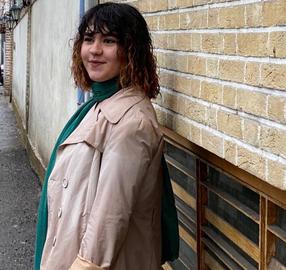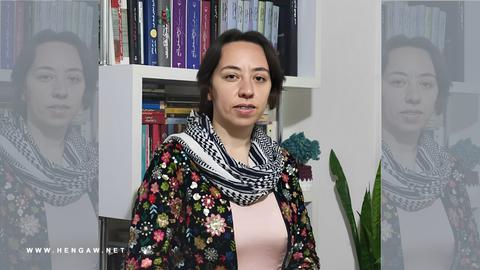In 2019 UNESCO added Turkmen carpets to its list of Intangible Cultural Heritage of Humanity and described them thus: “The carpets feature a dense texture ornamented with characteristic coloured patterns pertaining to one of the five main Turkmen tribes. They are characterised by patterns forming clear linear geometric arrangements. The context in which the carpet weaver lives - including local flora, fauna and the environment - is reflected in the combination of threads, pictures and colours creating the carpet designs… The carpet-making art is broadly integrated into the social and cultural life of Turkmen people and is considered as a sign of cultural identity and unity. Related skills and knowledge are transmitted within the family, and the viability of the tradition has been continuously ensured by community members.”
UNESCO was referring to carpets made in the Central Asian Republic of Turkmenistan, but Turkmens do not live only in Turkmenistan. A sizable number of the members of this ethnic Turkic group, variously estimated to be between half a million and 2.5 million, live in northeastern Iran, in Golestan province and a region called Turkmen Sahra.
Turkmens mostly still live in extended families where multiple generations can be found under the same roof, especially in rural areas, and making colourful and exquisite carpets is an old tradition among them.
Tradition Becomes Business
Zoleykha Adeli, nicknamed “Golnegar”, is a woman who has brought Turkmen carpets from the villages of Golestan province and exported them beyond the borders of Iran. “Producer of Turkmen carpets and rugs, Managing Director of Turkmen Golnegar Cooperative Co., advisor to the ladies with the Bandar Turkmen’s governor’s office and a Top National Job Creator” is how she introduces herself on her Instagram page.
In all the pictures of her Adeli is wearing the traditional costumes of Turkmen women: long and colourful scarves with floral patterns and long, cheerful dresses. She is an entrepreneur who has received numerous honours for founding carpet cooperatives and training workforces to make Turkmen carpets in Iran.
Adeli was born in the Caspian port city of Bandar Turkmen in 1973. After receiving a bachelor’s degree in Business Administration she studied carpet design and weaving at the University of Applied Science and Technology. Of course, like many young Turkmens, she had learned how to design and weave carpets from members of her own family. Adeli decided to establish a carpet cooperative. She started by hiring between 10 and 20 women, but then her venture expanded so much that now she works with a network of more than 500 people.
Adeli grew up in a community where colours and patterns played an important role in in the life of its members: large and colourful scarves with floral pattern and carpets that are patterned very differently from familiar Persian carpets from Kashan, Tabriz and Isfahan. She has never forgotten the first time she made a carpet: “I learned how to weave a carpet from my aunt one summer when I was with my grandmother. When I learned the basic principles I wove a very small carpet, smaller that than one square metre. I did all the work for making this carpet myself. For example, I did the warping [arranging strands of yarn so that they run lengthwise in weaving]… I love it so much.”
At a time when the girls around her married when they were still adolescents, Adeli chose a different life. She started her social activities when she was 17 by becoming a member of groups such as the Turkmen Women’s Society. “I was 23 when I married. The tradition was that girls married early and education was not considered to be important. I was told at the time that it was already too late for me.”
Adeli and her husband had a boy and a girl. Her husband had a different business, but after witnessing the hardships of the work she was doing he decided to lend a hand: “I needed help managing the affairs of production, sales and the establishment of the cooperative, and my husband came to my rescue. After him, my colleagues have been very helpful to me as well.”
Adeli entered the University of Applied Science and Technology in 1999 and was one of the first students to learn about weaving handmade carpets in an academic environment. After graduation she was chosen by the university to be director of its handmade carpets group. She and her colleagues set up specialised centres for handmade carpets in Golestan province and she was honoured by being named one of the Top 10 Women of the year.
Training Girls and Women
“In 1999 I took a loan of 50 million tomans and formed the Turkmen Golnar Handmade Cooperative Company,” she says. “After I entered the field of producing Turkmen carpets I got to know the best merchants in the country and made contact with carpet weavers. I identified artistic girls and women and introduced more than 3,000 of them to Carpetmaking Insurance [offered by Iran’s Welfare Organisation]. Those were hectic days. At the time I travelled to the remotest parts of the province and taught specialised courses. I encouraged girls and women to make Turkmen carpets. In the scientific area I also wrote books and defined the standards of weaving of Turkmen carpets as a factor in the expansion of the business cluster in Golestan province.”
Adeli persuaded a number of university graduates in related fields to join her cooperative. Job creation for young people was exactly what Adeli’s target community needed and her advice was well heeded: “Later all the members of this cooperative managed to have a carpet production business of their own or trained other people to go to work in this field.”
Adeli also opened a small shop so that the cooperative could offer its products for sale.
Her next step was to expand the training division of her venture, and she got a permit to establish a training centre. “This allowed me to train those who were interested in the production of carpets in the school and prepare them for work. After that my relationship with various bodies, unions and organisations related to this work expanded and my activities were recognised in the province. Thanks to these specialised courses I was acknowledged to be a factor in the expansion of the carpet business cluster in Golestan province.”
Every year now the company that Adeli founded is recognised as the top cooperative in the field of carpets and she has been chosen as the head of the Job Creation Commission for Women in Golestan province.
visit the accountability section
In this section of Iran Wire, you can contact the officials and launch your campaign for various problems



























comments